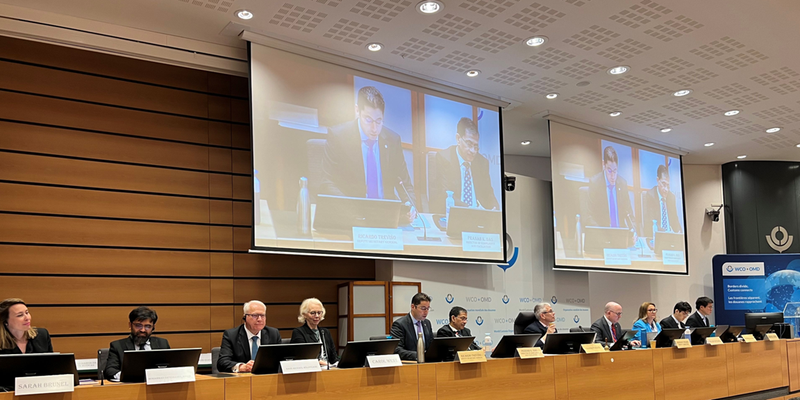Strengthening global partnerships: IPPC participates in World Customs Organization Round Table
Posted on Tue, 14 May 2024, 13:29

Panelists taking part in the round table discussion © World Customs Organization
Brussels, 26 April 2024 - The International Plant Protection Convention (IPPC) Secretariat participated in the 243rd/244th Permanent Technical Committee (PTC) meeting of the World Customs Organization (WCO) in Brussels, Belgium, held from 23-26 April 2024.
The WCO's theme for 2024, "Customs engaging traditional and new partners with purpose," set the stage for a Round Table session, where the IPPC Secretariat was invited as a speaker alongside the Asian Development Bank (ADB), the International Network of Customs Universities (INCU), and the WCO Private Sector Consultative Group (PSCG).
At the heart of the Round Table discussion was the exploration of ongoing and potential collaborations between the WCO and its partners, laying the groundwork for future endeavors. The session aimed to deepen and enrich existing relationships, ensuring that they remain strong, relevant and mutually beneficial. It also offered an opportunity for partners to contribute meaningfully to the WCO’s objectives of trade facilitation, border security, and global supply chain resilience.
Each speaker provided valuable insights into the existing partnerships between their organizations and customs administrations, with successful outcomes and highlighting areas for further collaboration and improvement.
The representative from the Asian Development Bank emphasized the need to strike a balance between trade facilitation, border security, and supply chain resilience. He also highlighted the necessity of adopting inclusive technologies that bridge the gap between developed and developing nations, including areas of current collaboration like customs automation, logistics and digitalization. The INCU representative centered on its role in bolstering customs capabilities through education and research-driven initiatives and advocated for closer partnerships between academia and customs administrations at both global and national levels.
Sarah Brunel, the Implementation and Facilitation Unit Lead at the IPPC Secretariat, stressed the critical role of effective collaboration between national plant protection organizations (NPPOs) and customs agencies in ensuring that global plant health standards and national phytosanitary import requirements are respected. Drawing from her expertise in capacity development, Brunel provided insights into the practical implementation of customs procedures in plant protection, citing examples from the IPPC community’s work on e-commerce, ePhyto and sea containers.
During the meeting, the Permanent Technical Committee of the WTO recommended that the Administrative Committee for the Customs Convention on Containers consider the Commission on Phytosanitary Measures (CPM) recommendation on Minimizing the pest risk associated with sea containers, as proposed by the IPPC Secretariat. This recognition of the value of the IPPC community's work strengthens the linkage and fosters improved collaboration between the IPPC and WCO.
Furthermore, participating in the PTC meeting and roundtable provided an opportunity for the IPPC and WCO Secretariats to better understand each other’s mandates and identify areas of mutual interest. Both organizations agreed to initiate discussions on renewing their joint work plan, pursuant to their cooperation agreement signed in 2018. Prospective areas for further collaboration include ePhyto and reducing the pest risk posed by both e-commerce and sea container pathways, aligning with the shared objectives of both organizations.
The WCO/WTO Smart report on disruptive technologies also presents an opportunity to work collectively at the forefront of innovation. This collaborative endeavor not only underscores the IPPC Secretariat's commitment to fostering global plant health but also signifies a stride towards harmonizing international efforts in safeguarding agriculture and the environment and facilitating safe trade.
Related information on the International Phytosanitary Portal:
DRAFT CPM RECOMMENDATION: Minimizing the pest risk associated with the sea container pathway

